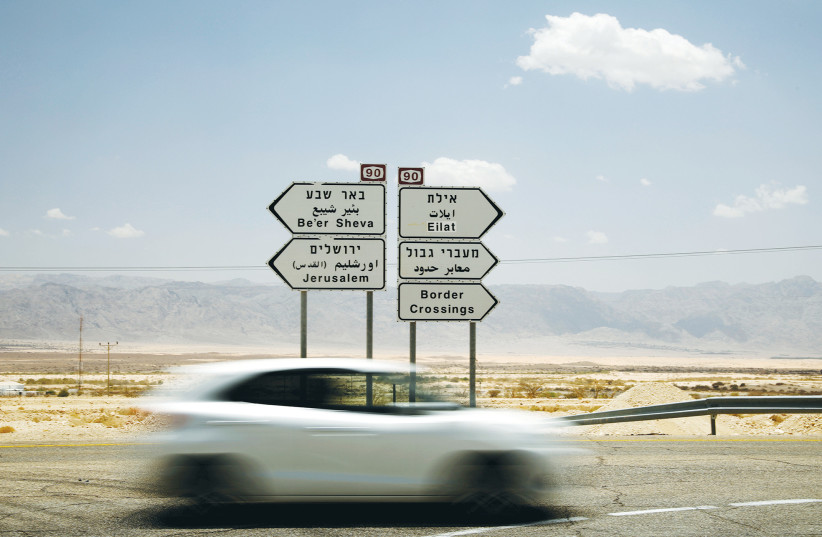On upscale Hovevei Zion Street in Talbiyeh, where many of the homeowners are native English speakers, there is a large sign affixed to one of the electricity poles, informing local residents of projects that have been approved by the Jerusalem District Planning and Building Committee. The text is signed by committee chairwoman Shira Talmi, who is a town planner by profession.
The sign, which has been put up by law, invites anyone who objects to the approved projects to submit their objections to the committee by a certain date, which is now long gone. But someone has written in large Hebrew letters along the length of the notice: “You have raped me with your silence.” The aggrieved writer may not be the only one raped by silence, and it’s possible that if everyone in the street could read and understand the text, including its legal jargon, there might have been many objections. But the notice is in only one language.
Yes, Hebrew is the first language of the country, but Israel is a country of immigrants, and notices that may affect their future should be published also in English, Russian, French and Amharic. At the very least, in a box in the center of the Hebrew notice, there should be information in the above languages stating that projects have been approved and details are available in various languages on a municipal or government website.
Translations of such notices can be done in cooperation with bilateral chambers of commerce, whose members can act as mentors to immigrants who may need help in understanding business and legal documents.

Know your way around a secondhand clothing store
■ EVER WONDERED how it is that so many women who live on low incomes succeed in looking like a million dollars? Simple. They know their way around secondhand clothing stores. They are familiar with the stores that charge almost as much for gently worn as one would pay for absolutely new – and avoid them like the plague. But they also know the stores that charge very reasonable prices for items that are classic and never go out of style, as well as items that are in line with the latest fashion trends and are discarded by wealthy women who never wear anything more than three times. A lot of stylishly dressed low-income women are very discerning, and if the price is right, especially for a garment bearing the label of a celebrity fashion house or designer, they will buy it, take it home, and wear it with aplomb at the first opportunity to show it off.
Secondhand clothing shops used to look like junk stores, but the current trend is to make them look as attractive as possible, which also makes them inviting to those women who used to shun them.
On Tuesday, November 9, between 12:30 p.m. and 8:30 p.m., there will be a great clothing sale of good quality items at ridiculously low prices at an Emunah fundraiser to support its various educational and social welfare projects. The venue is the social needs-conscious Silo Café at the First Station. The event includes a fashion show, refreshments and entertainment. The only hitch is that credit cards and checks will not be accepted. All payments must be made in cash.
Commending Laurent Levy for once
■ FRENCH OPTICS and real estate tycoon Laurent Levy has been criticized on several occasions in this column. Even though he built the impressive music center in downtown Jerusalem, we have it on good authority that at Safra Square he’s not exactly the flavor of the month.
However, despite all the criticism, he must be commended for one thing. The mammoth hotel and commercial project that he has on Jaffa Road is fenced in on all sides so that passersby cannot see the work in progress. But the fence is tastefully adorned with huge blown-up copies of photographs of Jerusalem during the era of the British Mandate. The photographs are detailed and give viewers a good perspective of gradual changes over the years.
As much as the British were then despised by Jews and Arabs alike, it cannot be denied that despite their lack of popularity, they made a tremendous contribution to the built-up areas of the city, though it is sad that some of the stately buildings that they commissioned have been converted into hostels, hotels and shops. Nothing lasts forever, and every new broom sweeps clean. Hopefully, some of the iconic buildings in the city, even if they don’t remain completely intact, will at least maintain their character and will not be destroyed to make way for yet another tall tower.
More benches added to Jerusalem
■ IT MAY be an optical illusion, but it seems that every few days additional benches are being added to Jerusalem both in town and in suburbia. In certain areas, such benches are almost always occupied. One imagines that in warm weather, they are also welcomed by homeless people who sleep on them at night.
greerfc@gmail.com
